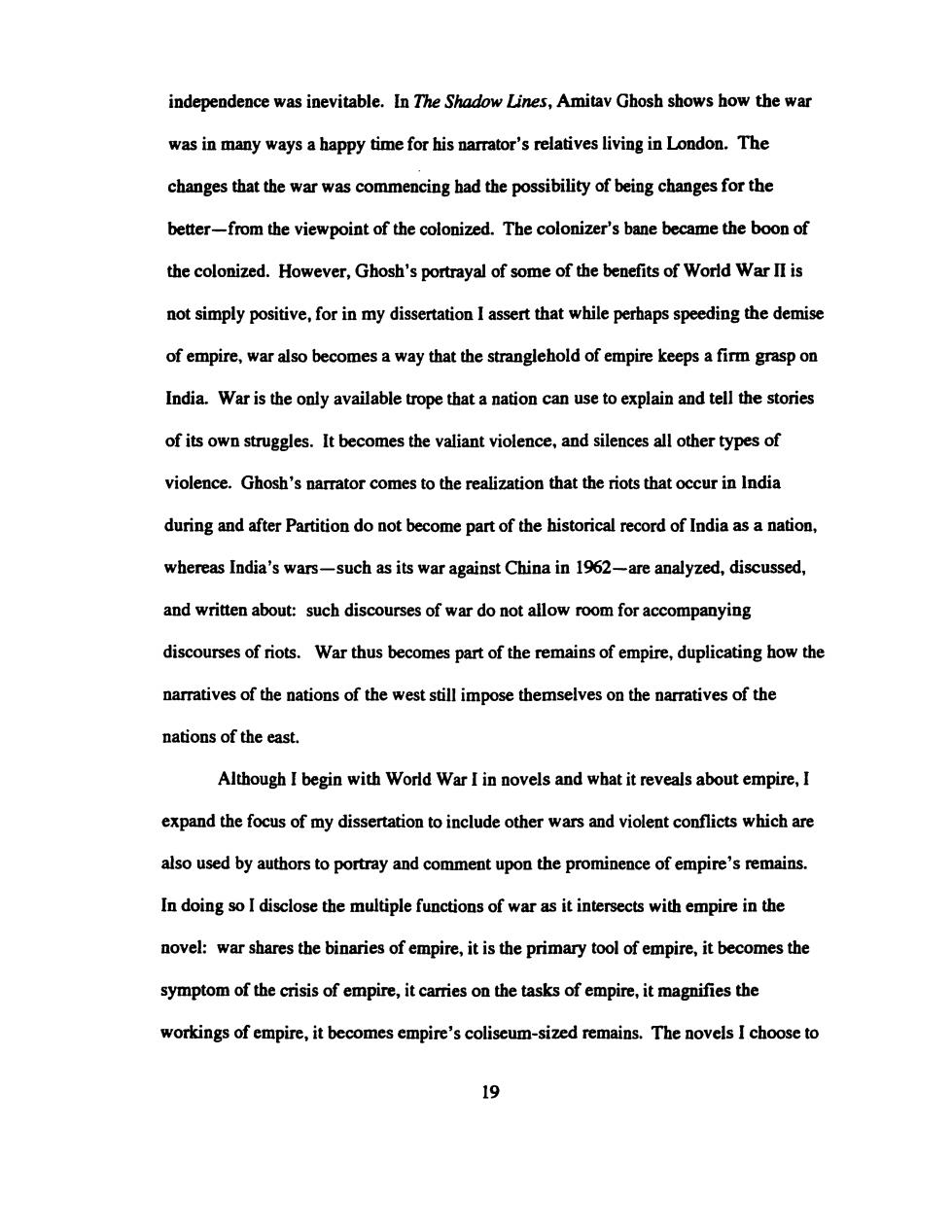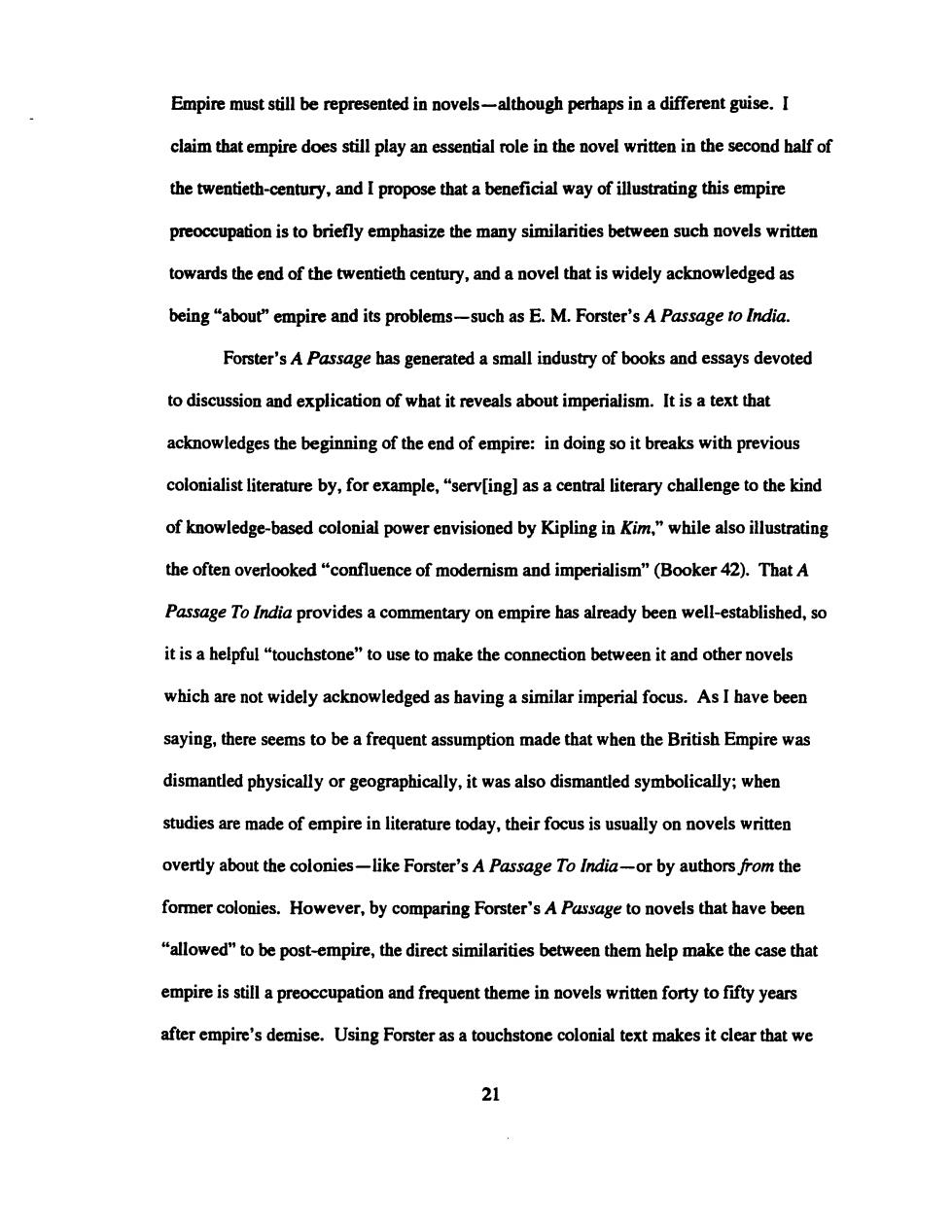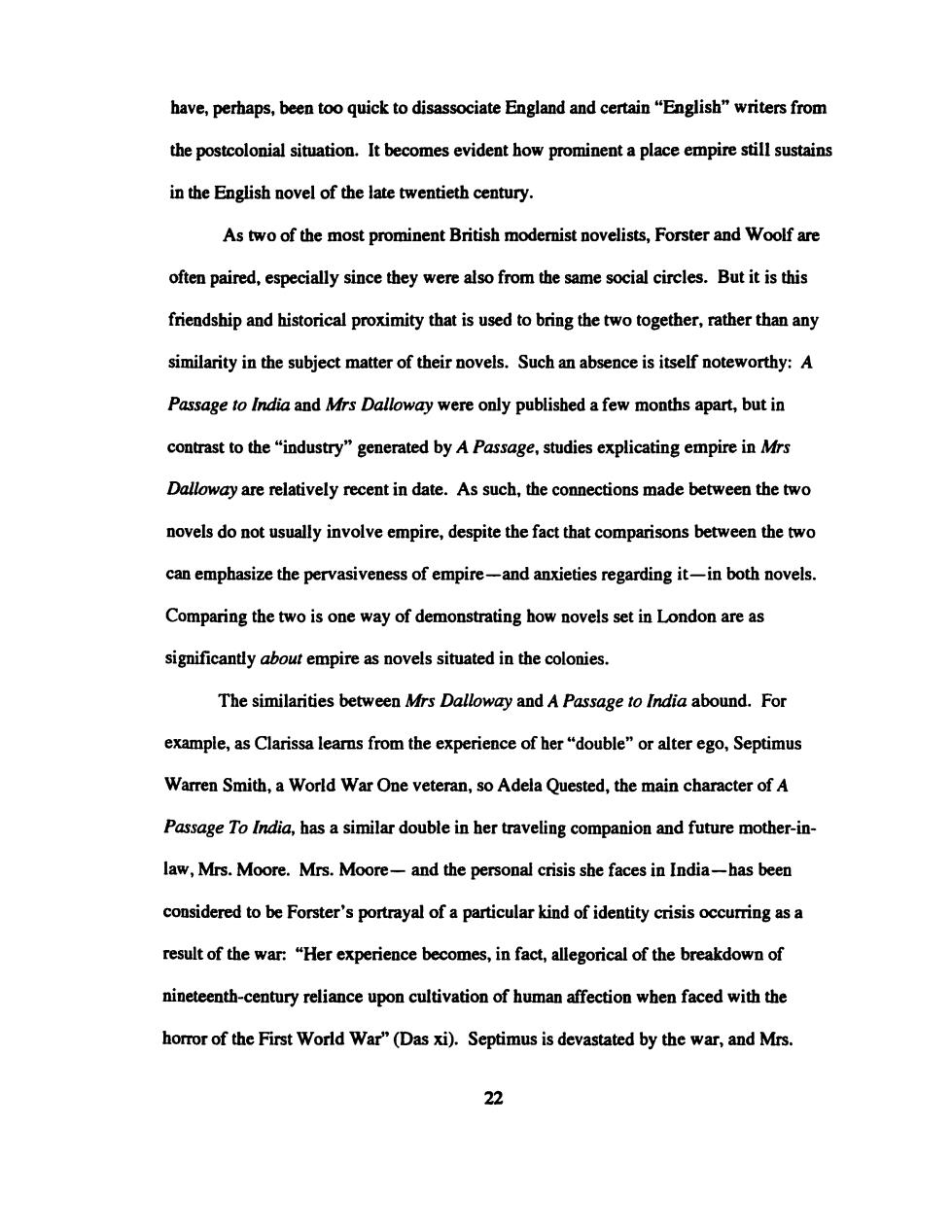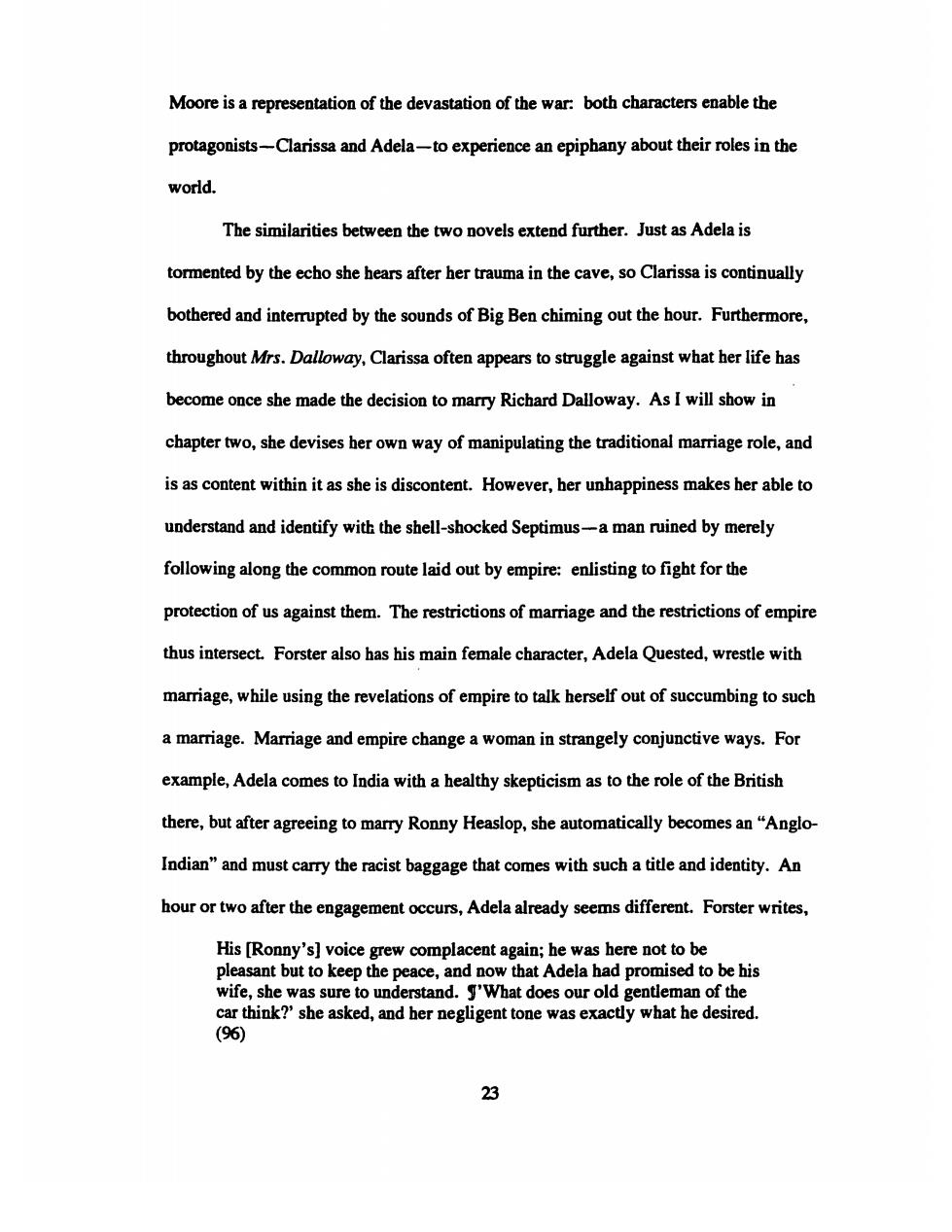
independence was inevitable.In The Shadow Lines,Amitav Ghosh shows how the war was in many ways a happy time for his narrator's relatives living in London.The changes that the war was commencing had the possibility of being changes for the better-from the viewpoint of the colonized.The colonizer's bane became the boon of the colonized.However,Ghosh's portrayal of some of the benefits of World War II is not simply positive,for in my dissertation I assert that while perhaps speeding the demise of empire,war also becomes a way that the stranglehold of empire keeps a firm grasp on India.War is the only available trope that a nation can use to explain and tell the stories of its own struggles.It becomes the valiant violence,and silences all other types of violence.Ghosh's narrator comes to the realization that the riots that occur in India during and after Partition do not become part of the historical record of India as a nation, whereas India's wars-such as its war against China in 1962-are analyzed,discussed, and written about:such discourses of war do not allow room for accompanying discourses of riots.War thus becomes part of the remains of empire,duplicating how the narratives of the nations of the west still impose themselves on the narratives of the nations of the east. Although I begin with World War I in novels and what it reveals about empire,I expand the focus of my dissertation to include other wars and violent conflicts which are also used by authors to portray and comment upon the prominence of empire's remains. In doing so I disclose the multiple functions of war as it intersects with empire in the novel:war shares the binaries of empire,it is the primary tool of empire,it becomes the symptom of the crisis of empire,it carries on the tasks of empire,it magnifies the workings of empire,it becomes empire's coliseum-sized remains.The novels I choose to 19

include all contain,utilize,and develop several of these junctures between war and empire,overlapping in some instances and in others proceeding in different directions.In Mrs Dalloway,for example,Woolf reveals the limitations of the binaries of war and empire,while also portraying the anxieties over empire raised by the First World War; Pat Barker's Regeneration trilogy incorporates these two aspects as well,and also furthers the connection between war and empire,by using war to work out the traumas caused by empire's loss;Margaret Drabble also explicates this traumatic loss of cultural identity resulting from the end of empire;and Ghosh shows the limitations of the binaries of war while also proving war to itself be a significant means of empire's perpetuation. My dissertation identifies and speaks to the war/empire nexus in the novels of the twentieth century. In Excavating the Remains of Empire,I examine how twentieth-century wars and violent upheavals are represented in novels,and conclude that novelists are frequently using war specifically as an instrument that allows them to access,both directly and indirectly,the topic of the British Empire and its dissolution.Novels,then,that in many ways seem to be post-empire,are in fact as riddled with the remains of empire as earlier novels were with the workings of empire.An important part of my project,therefore,is to read certain novels for empire that have hitherto been neglected in postimperial studies.If,as Said has claimed,"Without empire...there is no European novel as we know it"(69),then it is necessary to extend such readings of empire in novels to those novels written after empire's demise:for if empire once played such a significant role in the novel,then surely it does not just disappear after the official date of empire's end. 20

Empire must still be represented in novels-although perhaps in a different guise.I claim that empire does still play an essential role in the novel written in the second half of the twentieth-century,and I propose that a beneficial way of illustrating this empire preoccupation is to briefly emphasize the many similarities between such novels written towards the end of the twentieth century,and a novel that is widely acknowledged as being"about"empire and its problems-such as E.M.Forster's A Passage to India. Forster's A Passage has generated a small industry of books and essays devoted to discussion and explication of what it reveals about imperialism.It is a text that acknowledges the beginning of the end of empire:in doing so it breaks with previous colonialist literature by,for example,"serv[ing]as a central literary challenge to the kind of knowledge-based colonial power envisioned by Kipling in Kim,"while also illustrating the often overlooked "confluence of modernism and imperialism"(Booker 42).That A Passage To India provides a commentary on empire has already been well-established,so it is a helpful "touchstone"to use to make the connection between it and other novels which are not widely acknowledged as having a similar imperial focus.As I have been saying,there seems to be a frequent assumption made that when the British Empire was dismantled physically or geographically,it was also dismantled symbolically;when studies are made of empire in literature today,their focus is usually on novels written overtly about the colonies-like Forster's A Passage To India-or by authors from the former colonies.However,by comparing Forster's A Passage to novels that have been "allowed"to be post-empire,the direct similarities between them help make the case that empire is still a preoccupation and frequent theme in novels written forty to fifty years after empire's demise.Using Forster as a touchstone colonial text makes it clear that we 21

have,perhaps,been too quick to disassociate England and certain "English"writers from the postcolonial situation.It becomes evident how prominent a place empire still sustains in the English novel of the late twentieth century. As two of the most prominent British modernist novelists,Forster and Woolf are often paired,especially since they were also from the same social circles.But it is this friendship and historical proximity that is used to bring the two together,rather than any similarity in the subject matter of their novels.Such an absence is itself noteworthy:A Passage to India and Mrs Dalloway were only published a few months apart,but in contrast to the "industry"generated by A Passage,studies explicating empire in Mrs Dalloway are relatively recent in date.As such,the connections made between the two novels do not usually involve empire,despite the fact that comparisons between the two can emphasize the pervasiveness of empire-and anxieties regarding it-in both novels. Comparing the two is one way of demonstrating how novels set in London are as significantly about empire as novels situated in the colonies. The similarities between Mrs Dalloway and A Passage to India abound.For example,as Clarissa learns from the experience of her"double"or alter ego,Septimus Warren Smith,a World War One veteran,so Adela Quested,the main character of A Passage To India,has a similar double in her traveling companion and future mother-in- law,Mrs.Moore.Mrs.Moore-and the personal crisis she faces in India-has been considered to be Forster's portrayal of a particular kind of identity crisis occurring as a result of the war:"Her experience becomes,in fact,allegorical of the breakdown of nineteenth-century reliance upon cultivation of human affection when faced with the horror of the First World War"(Das xi).Septimus is devastated by the war,and Mrs. 22

Moore is a representation of the devastation of the war:both characters enable the protagonists-Clarissa and Adela-to experience an epiphany about their roles in the world. The similarities between the two novels extend further.Just as Adela is tormented by the echo she hears after her trauma in the cave,so Clarissa is continually bothered and interrupted by the sounds of Big Ben chiming out the hour.Furthermore, throughout Mrs.Dalloway,Clarissa often appears to struggle against what her life has become once she made the decision to marry Richard Dalloway.As I will show in chapter two,she devises her own way of manipulating the traditional marriage role,and is as content within it as she is discontent.However,her unhappiness makes her able to understand and identify with the shell-shocked Septimus-a man ruined by merely following along the common route laid out by empire:enlisting to fight for the protection of us against them.The restrictions of marriage and the restrictions of empire thus intersect.Forster also has his main female character,Adela Quested,wrestle with marriage,while using the revelations of empire to talk herself out of succumbing to such a marriage.Marriage and empire change a woman in strangely conjunctive ways.For example,Adela comes to India with a healthy skepticism as to the role of the British there,but after agreeing to marry Ronny Heaslop,she automatically becomes an "Anglo- Indian"and must carry the racist baggage that comes with such a title and identity.An hour or two after the engagement occurs,Adela already seems different.Forster writes, His [Ronny's]voice grew complacent again;he was here not to be pleasant but to keep the peace,and now that Adela had promised to be his wife,she was sure to understand.y'What does our old gentleman of the car think?'she asked,and her negligent tone was exactly what he desired. (96) 23